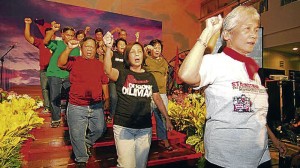It was a whole year of learning for me. I had been a teacher for a good number of years but was now learning from colleagues who were experimenting on a new form of “society,” where the have-nots would have equal rights as those born with the silver spoon.
As a director, I learned to respect and love my audience more. I learned that a responsible artist doesn’t ask what the audience wants, but what it needs. Since we were only experimenting on proletarian theater, refusing to become clones of its Chinese counterpart, I had to learn from experience and from the Filipino viewer. Everywhere we performed, we learned from the audience—and from experience.
It was a thoroughly exciting period for me. We tackled issues that affected their lives, as well as their hopes and dreams. We performed in rallies at Plaza Miranda, during strikes, in markets, traffic-ridden streets, crowded slums, and even in churches.
Emphasis
Most of the time, we performed in the open, so the Gintong Silahis actors had to learn to use their voices as ancient Greek actors did—after all, the human voice came before microphones. For them to be heard, I made the actors speak as a group. Chorale recitations were the mode, but solo lines were repeated for effect and emphasis. What was urgent was to relay the message to as many people as possible.
Time was of the essence, so we wrote scripts that were terse but interesting. We tried to incorporate Pinoy forms and attitudes. I realized that Filipinos as an audience are lyrical. They may sit up for radical portions, but they’re only moved by what’s lyrical, the way they react to “Bayan Ko.”
We would get shot at or dispersed violently, because cultural contingents were always at the front during demonstrations—but, we were buoyed up by the audience we loved!
Love your audience, I urged the actors. Form is the result of need. There’s a relationship between form and content. If what you’re saying is important, wouldn’t you exhaust all the means for the audience to understand your message?
More expressive
So, the actors had to be more expressive, malleable and dynamic. They exercised 30 minutes every day before performing poems, skits and production numbers. And, to bolster their morale, regular discussions on issues were held.
We created prototype scripts that encompassed the different sectors of society. At the time, cultural workers were as informed about political, economic and social issues as political science majors. It was truly a liberating experience!
